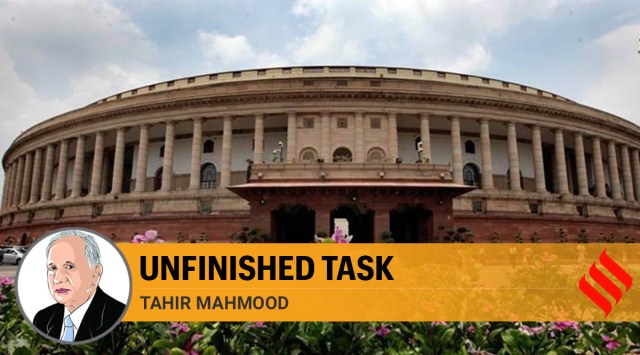- India
- International
All states must be brought into the mainstream of family laws
There is no justification for keeping some chosen groups of Indian citizens perpetually tied down to family laws based either on outdated foreign laws or on archaic local customs.
 The preliminary sections in all central family law Acts enacted by Parliament since Independence declare that they will apply to “the whole of India except the state of Jammu and Kashmir.”
The preliminary sections in all central family law Acts enacted by Parliament since Independence declare that they will apply to “the whole of India except the state of Jammu and Kashmir.”Does the provision of Article 44 of the Constitution of India relating to uniform civil code target only inter-personal diversity in family law? Though not warranted by the wording of the provision, this has always been the general belief among the custodians of state authority, including the judiciary. Ignoring the words “throughout the territory of India” at the end of the article, they have invariably understood it as a directive only for the repeal of the traditional personal laws and their replacement by a common family law Act. The tremendous territorial diversity in the country’s family law regime, existing since the pre-Independence era, has been perpetuated by executive action and has never been frowned upon in any court judgment.
The preliminary sections in all central family law Acts enacted by Parliament since Independence declare that they will apply to “the whole of India except the state of Jammu and Kashmir.” To these sections, a new provision was added in 1968 in all these Acts, pronouncing that “nothing herein contained shall apply to the Renoncants in the Union Territory of Pondicherry.” A third exception, not mentioned in these Acts but otherwise well known, is that none of these Acts applies in Goa, Daman and Diu. A fourth exception, relating to the north-eastern states of Nagaland and Mizoram, emanates from Articles 371A and 371G of the Constitution, decreeing that no parliamentary legislation will replace the customary law and religion-based system for its administration in both these states unless so demanded by the local legislatures. Eating into the constitutionally ordained principle of generality of family law throughout the country, these exceptions regulate the extent of all central laws — from the Hindu Marriage Act of 1955 up to the Muslim Women (Protection of Rights on Marriage) Act of 2019.
In Goa, Daman and Diu, the Portuguese rulers had recognised locally prevailing personal laws by the name “native customs and usages”, which were separately compiled for the three territories and given the force of law by royal decrees issued from Lisbon. The Portuguese Civil Code of 1867 was extended to these places in 1869, with a rider that native customs and usages will be safeguarded “so far as they are not inconsistent with morality or public order.” The new laws of civil marriages enacted in Portugal in 1910, and of canonical marriages enforced there in 1946, were also later extended to the three territories, but with a similar protective provision for the local customary laws. Upon the merger of these territories into the Indian union after Independence, the Goa, Daman and Diu Administration Act of 1962 maintained the status quo by laying down that “all laws in force” there earlier shall continue to apply until and unless amended or repealed by a competent authority.
None of the central family law Acts has been extended to the said territories till date — the Portuguese Civil Code remains in force there along with the codes of native customs and usages and the matrimonial decrees of 1910 and 1946 cited above. Formation of Goa as a state in 1987 made no change in this regard. That Goa is governed by a common civil code is, in fact, a commonly prevailing myth shared even by some learned judges. What will be the position in Daman and Diu after their merger with Dadra and Nagar Haveli in 2019 to form a single Union territory is yet uncertain.

In Puducherry, during the French rule, the native population had been given an option to choose between the personal laws then in force there and the Code Napoleon of 1804, and those who had opted for the latter were called renoncants (renouncers). After the gradual merger of the territory into the Union of India after independence, the Pondicherry (Laws) Act of 1968 extended all the central family law Acts, but each with a rider that they would not apply to the renoncants.
The exclusionary provision relating to Jammu and Kashmir found in the central family law Acts had emanated from Article 370 of the Constitution. Last year, in 2019, the Constitution (Application to Jammu and Kashmir) Act and the Jammu and Kashmir (Reorganisation) Act have drastically changed the position in that part of the country. The latter Act has extended there all central family law enactments and repealed the parallel local laws — as many as 15.
Bringing Jammu and Kashmir into the country’s mainstream of family laws is an exercise that needs to be undertaken also for Goa, Daman and Diu, Puducherry, Nagaland and Mizoram, where the present situation is an antithesis to the constitutional doctrine of uniformity in family law for the entire nation. There is no justification for keeping some chosen groups of Indian citizens perpetually tied down to family laws based either on outdated foreign laws or on archaic local customs. The citizens’ fundamental rights to equality before law and equal protection of the laws guaranteed by the Constitution call for a similar action in respect of these territories as well. So does the provision of Article 44 enjoining the state to make endeavours to secure for the citizens a uniform civil code throughout the territory of India.
The writer is distinguished jurist chair and professor of eminence, Institute of Advanced Legal Studies, Amity University
40 Years Ago
EXPRESS OPINION
Apr 18: Latest News
- 01
- 02
- 03
- 04
- 05









































